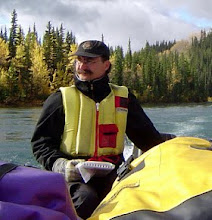Early in summer I proposed a canoe trip to our hiking club. Originally planned as a five day expedition I found few people were current in their paddling skills and that several novices were also keen to come along. The plan was adjusted to include a canoe and paddle intro session on a small lake and a shorter overnight trip on our stretch of the Yukon River.
 |
| Peter Long photo |
After a hearty breakfast at our friend David's cafe, we walked down to the river front with our gear where Scott and his staff set out canoes, paddles, life jackets and provided a helpful river safety briefing. We matched novices with experienced in each canoe and packed up. One after another we practiced our first eddy turns out into the river current.
The weather was sunny and warm. Our fleet of seven canoes and support boat meandered downriver, each canoe exploring nooks along the river bank or experimenting with paddle strokes trying to master the straight line. Others stopped for a shore lunch and hiked up Little Takhini Creek to see the beaver dams.
 |
| Peter Long Photo |
At Egg Island, our overnight camping spot, we landed like geriatric Viking raiders and spread out over the island. We met two young families already on the island and they kindly moved things about to give us elbow room.
We set up a comfortable camp and over the afternoon hours a magnificent feast came together. We invited David and Doree Story, who live on the river near the island, over for dinner. The Storys have acted as stewarts of the island for the past twenty years and we were pleased to be able to honour their time and effort in keeping Egg Island such a pleasant place. The evening rollicked with colourful stories, jokes and high spirits.
Our island compatriots in their freighter canoe approaching The Duts'al Dhäl on the last leg of the trip.
Barb led us in Pilates exercises in the mornings to keep us from stiffening up while Peter tracked our journey on his GPS. I refrained from asking our average speed.
We stopped for lunch at Chamia and relaxed before ending the day at Policeman's Point just another two bends down the river.
The fleet approaches the upper end of Lake Laberge, a successful trial. Next year we'll tackle something more ambitious.
.JPG)
.jpg)
.jpg)


e.jpg)
.JPG)


.jpg)
.jpg)
.jpg)
.jpg)
.jpg)
.jpg)
.jpg)

.jpg)
.jpg)


.jpg)
.jpg)



.jpg)
.jpg)

.jpg)

.jpg)